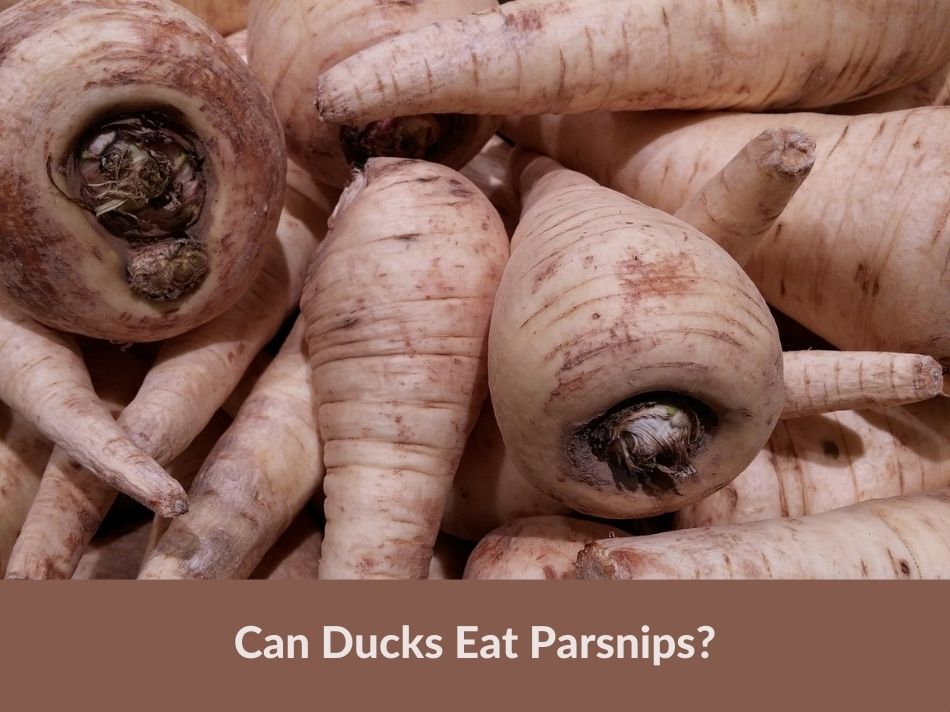Ducks are generally omnivorous creatures, feasting on a smorgasbord of plants, seeds, small fish, and insects. But, can ducks eat parsnips?
Yes, ducks can absolutely eat parsnips. Parsnips are not harmful to ducks, but like any other treat, they should be offered in moderation. They’re a great source of dietary fiber, vitamins, and minerals that can complement their usual diet.
In this article, you’ll find comprehensive information on whether ducks can eat parsnips, how often they should be fed this vegetable, and its nutritional benefits.
How Often Can I Feed My Ducks Parsnips?
As a rule of thumb, treats like parsnips should not make up more than 10% of a duck’s daily diet. You can offer them chopped-up parsnips once or twice a week. It’s also important to provide ducks with fresh water when feeding them any kind of treat, including parsnips, as it aids in digestion.
Can Ducklings Eat Parsnips?
When it comes to the little quackers, caution is the name of the game. Ducklings have different nutritional requirements compared to adult ducks. It’s generally advisable to stick to duck starter feed and avoid treats like parsnips for the first few weeks of their lives. Once they’ve grown a bit and have been introduced to other types of food, small, soft pieces of parsnips can be gradually introduced.
Parsnips Nutritional Value
Below is the nutritional value of 100 grams of parsnips.
- Calories: 75
- Protein: 1.2 grams
- Carbohydrates: 17.99 grams
- Fiber: 4.9 grams
It also contains several vitamins and minerals as listed below.
- Vitamin C
- Vitamin K
- Folate
- Vitamin E
- Magnesium
- Thiamine
- Phosphorus
- Zinc
- Vitamin B6
Are Parsnips Healthy for Ducks?
Certainly, parsnips are indeed a healthy option for ducks when fed in moderation. They are rich in dietary fiber, which is good for digestion. Additionally, parsnips contain essential vitamins such as Vitamin C, Vitamin K, and Folate, as well as important minerals like Magnesium, Phosphorus, and Zinc. These nutrients support various bodily functions, including feather formation and immune system health.
- Vitamin C: Helps with collagen production and boosts the immune system. It’s essential for maintaining good skin, feather quality, and overall health.
- Vitamin K: Important for blood clotting and bone metabolism. Helps ducks recover from minor injuries and maintains strong bones.
- Folate: Crucial for cell division and the neural development of ducklings. It’s especially important for egg-laying ducks to ensure healthy offspring.
- Vitamin E: Acts as an antioxidant, protecting cell membranes in skin and feathers. It also helps with immune function.
- Magnesium: Aids in nerve function and muscle relaxation, making it easier for ducks to swim and move about.
- Thiamine (Vitamin B1): Helps convert food into energy, supporting the ducks’ daily activities like foraging and swimming.
- Phosphorus: Important for strong bones and energy transfer within cells. Helps ducks stay active and alert.
- Zinc: Vital for enzymatic reactions, feather growth, wound healing, and reproductive health.
- Vitamin B6: Supports protein metabolism and neurotransmitter production, contributing to both physical and mental health.
How To Feed Parsnips To Ducks
Feeding parsnips to ducks can be a straightforward process if you follow some basic guidelines. Here’s how to go about it:
- Quality Check: Make sure the parsnips are fresh, and free from pesticides or chemicals. Organic parsnips are the best option if available.
- Preparation: Wash the parsnips thoroughly under running water. You can choose to peel them, although it’s not strictly necessary. Cut them into small, bite-sized pieces so the ducks can easily consume them. If you prefer, you can also cook the parsnips to soften them, but avoid adding any seasonings.
- Portion Size: Remember that treats like parsnips should only make up a small portion of a duck’s diet, usually no more than 10%. Keep the portions small and manageable.
- Feeding Method: Scatter the small pieces of parsnip either directly into the water or on the ground nearby where ducks are foraging. If you’re feeding domestic ducks in a controlled environment, you can place the pieces in their regular feeding dish.
- Water Supply: Always provide fresh water when you offer any kind of food, including parsnips. Ducks need water for proper digestion, and it’s especially important when they’re consuming dry or fibrous foods.
More Vegetables Ducks Can Eat
In addition to parsnips, ducks can also safely consume a variety of other vegetables that offer different nutritional benefits. Below are some more tasty veggies for ducks.
Conclusion
So there you have it—parsnips can be a nutritious and enjoyable addition to a duck’s diet when given in moderation. Whether you’re responsible for a flock or just a park visitor looking for a healthy alternative to offer, parsnips are a viable option.
Always remember to provide fresh water alongside any treats to assist with digestion.
Disclaimer: The information in this article is for informational purposes only. I'm not an expert or a veterinarian.


